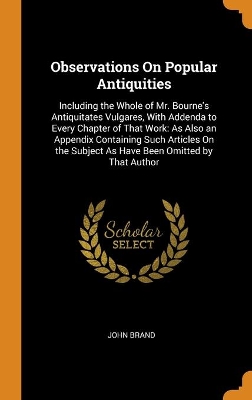Observations on Popular Antiquities 2 Volume Set
2 primary works
Volume 1
John Brand (1744-1806), secretary of the Society of Antiquaries, first published his widely popular Observations on Popular Antiquities in 1777. This fascinating two-volume almanac of British superstitions and customs was in fact a heavily revised and annotated version of Henry Bourne's Antiquitates vulgares (1725). Beginning with New Year's Eve, Volume 1 describes the origins and practices of British calendar festivals including religious holidays, saints' days, seasonal celebrations such as May Day and the Summer Solstice, and obscurer festivities such as the Feast of Sheep Shearing. Following the success of the book's initial reception, Brand continued to research English folklore with the intention of publishing fuller information. This two-volume version, published posthumously in 1813, was edited and expanded by Sir Henry Ellis, Keeper of Manuscripts at the British Museum, and further revisions also appeared in 1841 and 1870. Brand's book is regarded as the foundation for folklore studies in England.
Volume 2
John Brand (1744–1806), secretary of the Society of Antiquaries, first published his widely popular Observations on Popular Antiquities in 1777. This fascinating two-volume almanac of British superstitions and customs was in fact a heavily revised and annotated version of Henry Bourne's Antiquitates vulgares (1725). Volume 2 of Brand's almanac concerns the origins and practices of British customs and ceremonies including marriage customs, death rites, belief in fairies, witchcraft, omens, and divination. The volume also provides explanations for obscure but common phrases and expressions. Following the success of the book's initial reception, Brand continued to research English folklore with the intention of publishing fuller information. This two-volume version, published posthumously in 1813, was edited and expanded by Sir Henry Ellis, Keeper of Manuscripts at the British Museum, and further revisions also appeared in 1841 and 1870. Brand's book is regarded as the foundation for folklore studies in England.

